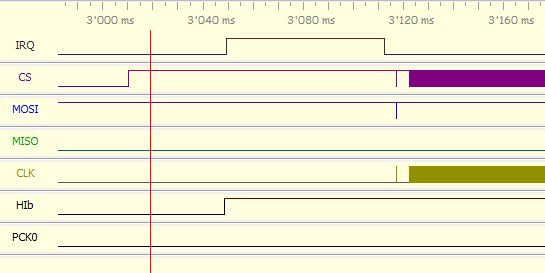We are currently porting our CC3000 code to CC3100. In order to verify the HW and SW we connected a CC3100BOOST to our device and removed the CC3000 from our device.
We observe now that after nHIB goes high, the IRQ goes high and after ~50ms back to low. Then the spi communication starts with a single write. This is followed by many reads until the device watchdog finally hits after some seconds.
Here you see the first SPI write:
Followed by many SP read (only clocks, no response from CC3100 for a many seconds)
I tried also the option with sl_start(0,0, callback). The ISR is also triggered, but then no SPI communication occurs and the callback is never called.
Thank you in advance for your support.













